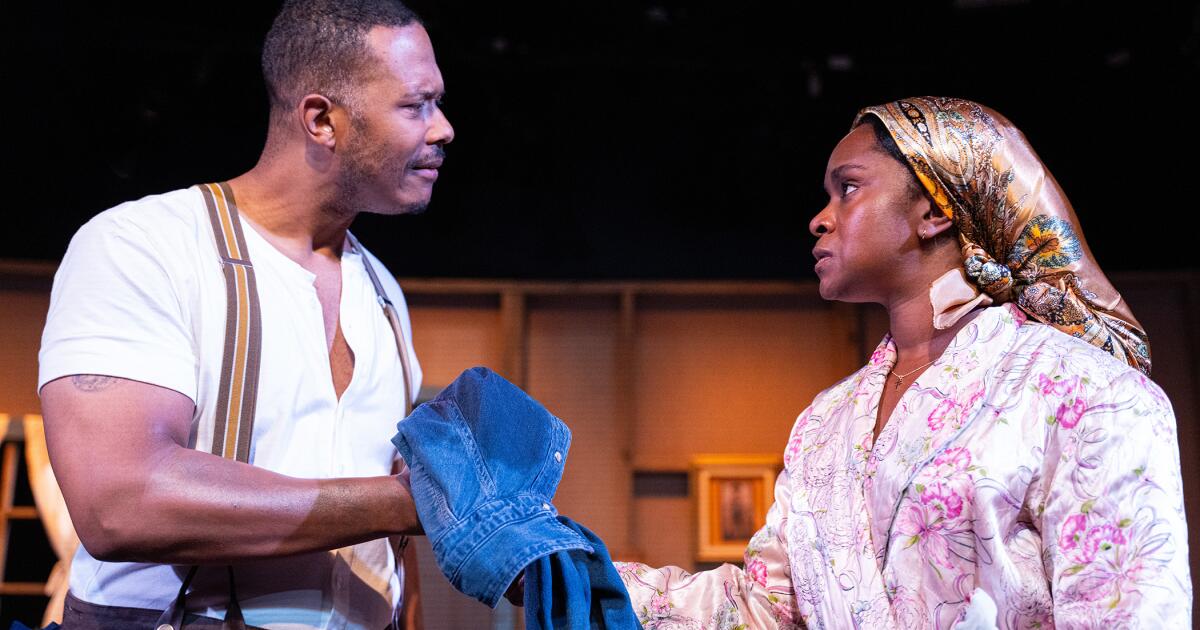“Berta, Berta,” a two-character play by Angelica Chéri, was inspired by a prison work song from Parchman Farm, the notorious Mississippi State Penitentiary whose harsh conditions and history of forced labor extended the nightmare of antebellum slave plantations into the 20th century.
The play, which is receiving its West Coast premiere in an Echo Theater Company production at Atwater Village Theatre directed by Andi Chapman, is set in Mississippi in 1923. The action takes place in the home of Berta (Kacie Rogers), a young widow who’s awakened in the middle of the night by a visitor from her past.
Not just any visitor, mind you, but the love of her life. Leroy (DeJuan Christopher) arrives at the threshold of her small, well-cared for home in a clamorous uproar. He’s filthy, his white shirt is covered in blood, and Berta can’t tell if he’s possessed by the devil or out of his mind.
It turns out that he’s killed a man who claimed, falsely, to have slept with her. Berta is horrified that Leroy has done something so rash and violent. He holds it as proof of the depth of his love for her. But why, Berta wants to know, did he not get in touch with her after he was released from Parchman? The crime he’s committed will only send him back to where, in Leroy’s own pained words, “they take the colored man to kill him from the inside out.”
Berta and Leroy exchange grievances over the futility of their love. He can’t understand how she could have married; she’s bewildered that he could have expected her to wait indefinitely for a ghost. Their passion, however, won’t be denied, no matter how angry they make each other.
The play is pitched for maximum intensity, and Chapman’s direction encourages a mythic scope — a wholly appropriate approach for a drama that leaps over the safety of realism. Amanda Knehans’ beautifully designed set, as snug as it is appealing, grounds the action in a clean and cozy domesticity. But this is just an illusion, as the production makes clear through the expressionistic wildness of the lighting (Andrew Schmedake) and sound design (Jeff Gardner).
The couple has been granted a brief reprieve from their separation. Leroy, observing an old superstition, made an oath to the awakening cicadas that he will turn himself in if he’s given the chance to make peace with Berta. She has made her own pact with the insects, asking them to restore the life of her stillborn baby, whose corpse she has held onto in the hope that the cicadas will answer her prayer.
The pressurized, supernatural stakes in such tight quarters sometimes encourage Christopher to push a little too vociferously. Berta’s home is too small to contain Leroy — and Christopher’s performance never lets us forget it. But the turbulent charge of Leroy’s voice and body language serves another purpose: keeping the character’s history as an oppressed Black man cruelly cut off from his soulmate ever in sight.
Rogers’ Berta, comfortably situated in her domestic nest, scales her performance accordingly. She is our anchor into the world of the play, reacting to Leroy’s tumultuous intrusion with suspicion and alarm. But as the intimacy grows between the characters, the performers become more relaxed and playful with each other. The Wagnerian nature of Berta and Leroy’s love settles down without losing its miraculous mystery.
The Sunday matinee I attended was a Black Out performance — an opportunity for a Black audience to experience the play in community. Playwright Jeremy O. Harris championed this concept during the initial Broadway run of his groundbreaking drama “Slave Play.” There was backlash to the idea in London, where some critics found the practice racially exclusionary. But anything that promotes the communal embrace of art, particularly among historically underrepresented groups, ought to be celebrated.
I wasn’t the only white person in the audience at “Berta, Berta” on Sunday, but I was one of just a few. When I had initially learned from the show’s publicist that the performance was specially designated, I offered to come at another time, not wanting to take a seat from a community member. But I was assured that there was room and that I was most welcome.
Listening to the play in this special environment, I was more alert to the through line of history. Although set in the Deep South during the Jim Crow era, there appeared to be little distance between the characters and the audience. Berta and Leroy’s tempestuous love games were met with amused recognition. And the threats facing the couple, to judge by the audible response to the work, were received with knowing empathy.
At a different performance, I might have been more impatient with some of the strained dramatic turns. But the production’s living bond with the audience opened my eyes to the realism inherent in this folktale romance, laden with history and floating on a song.
‘Berta, Berta’
Where: Echo Theater Company, Atwater Village Theatre, 3269 Casitas Ave., Los Angeles
When: 8 p.m. Fridays, Saturdays and Mondays; 4 p.m. Sundays. Ends Aug. 25
Tickets: $38 Fridays, Saturdays and Sundays; pay-what-you-want Mondays
Contact: www.EchoTheaterCompany.com or (747) 350-8066
Running time: 1 hour, 30 minutes (no intermission)



